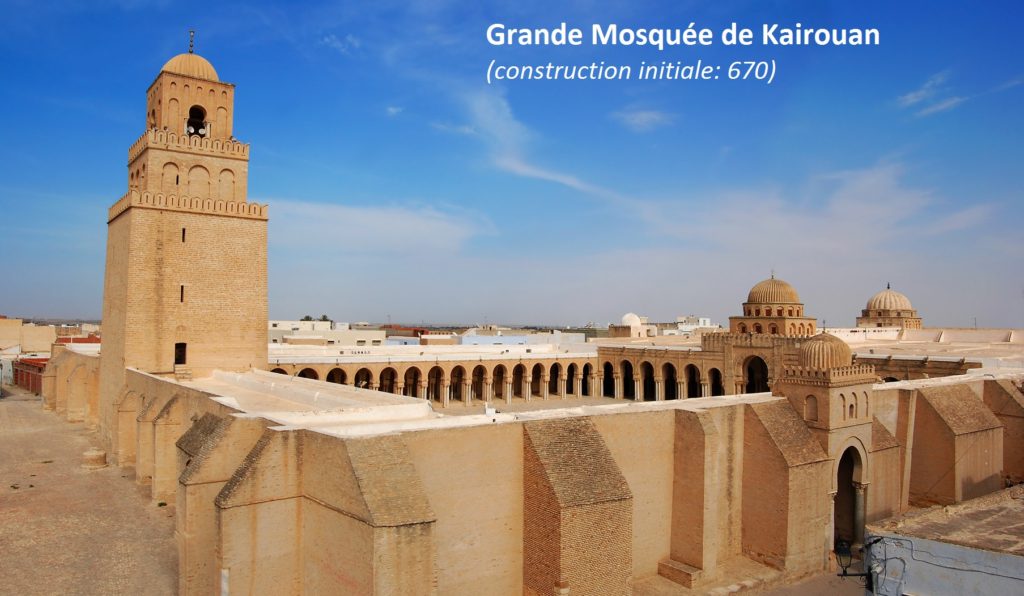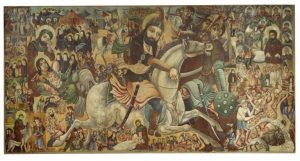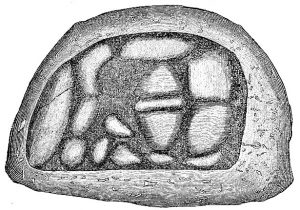
670 AD to 690 AD, Psalm 81: Greek Fire.
This site was first built in French (see www.147thgeneration.net). The English translation was mainly done using « google translation ». We have tried to correct the result of this translation to avoid interpretation errors. However, it is likely that there are unsatisfactory translations, do not hesitate to communicate them to us for correction.
(for that click on this paragraph)
Summary
This generation is from the years 670 AD to 690 AD.
According to our count, this generation is the 81st generation associated with Psalm 81. It is in this Psalm 81 that we therefore find an illustration of the facts of this generation.
Since Caliph Ali had been assassinated in 661, Muawiya reigned supreme; he had established his capital at Damascus and founded the Umayyad dynasty, which was to last eighty years. He returns to the assault on Constantinople. His army in Anatolia and his fleet along the Ionian coast pillaged one by one the cities and the imperial islands.
In 672, his ships entered the Sea of Marmara. Two years later began the siege. But the Byzantines have a secret weapon: the “Greek fire”.
The inflamed, oily liquid spilled over the surface of the water, set fire to the boats’ wooden hulls and caused the deaths of those who were trying to escape by jumping overboard. For a long time, the Muslims refused to admit their defeat. It was only after five years that the exhausted survivors of the Saracen fleet turned back to return home. Muawiya accepted, willy-nilly, the peace proposed by Constantine (IV).
If the Saracens had taken Constantinople in the seventh century rather than the fifteenth, all Europe – and America would no doubt be Muslim today.
In fact this generation is a key generation, by the failure of the Muslim troops against Constantinople, it symbolizes the separation of the world between East and West between Christian world and Muslim world.
The Muslim world is itself divided between an uncompromising Islam, advocated by the Shiites, and an Islam open to the world advocated by the Umayyad dynasty, under the strong influence of the still influential Christian elite (as measure of generations, the Christian notables will eventually convert to Islam).
The new Muslim empire, which is closed from entering Europe by the Byzantine gate, continues its conquest of the Mediterranean rim towards the west and found new cities such as Kairouan in 670. These new cities are opportunities for development for new Jewish communities.
Talk
Assault on Constantinople
On the side of Byzantium, Constant II died assassinated in 668 and it is his son Constantine IV who succeeds him. It reigns from 668 until 685, a good part of the generation that interests us. Constantine IV dies prematurely at 33 years old and it is his son Justinian II who succeeds him to reign from 685 until 695.
The reign of Constantine is marked by a new episode of the struggle between Byzantium and the Muslim armies which for the first time turns to the advantage of Byzantium:
- The first [1] decade of his reign (Constantine IV) was marked by a reversal in the history of Christianity: for the first time, the Crescent armies were repulsed and put to flight by those of the Cross. This brief respite did not last. Since Caliph Ali had been assassinated in 661, Muawiya reigned supreme; he had established his capital at Damascus and founded the Umayyad dynasty, which was to last eighty years. Now that his resources were immensely increased, he resumed his old tactics (in the time of the Otman caliphate, Muawiya was already leading the Muslim troops, and among other things, he had taken Cyprus by giving the Muslim army in particular naval force it did not possess before): its army in Anatolia and its fleet along the Ionian coast pillaged imperial cities and islands one by one. Finally, in 672, his ships entered the Sea of Marmara, where he took the peninsula Cyzique, eighty kilometers from Constantinople. Two years later began the siege.
Muawiya’s succession
On the Muslim side, Muawiya had succeeded after Ali’s death to ease tensions with his successors by having Hasan abdicated and refusing to fight Husayn another son of Ali who refused to swear allegiance to him.
His successor Yazid 1st (680-683) will confront him. Thinking to invest the city of Kufa, Husayn is taken speed by Yazid 1st, whose envoys first execute the emissaries of Husayn and then meet Husayn en route to Kufa and decimate his troops in Kerbela. Husayn himself being killed and his body broken in pieces, thus fueling Islam’s dissensions for many centuries: Husayn was the son of Ali, the first male believer, cousin of the Prophet, and grandson of the prophet, son of Fatima , daughter of the prophet.
In Yazid 1st, succeeds his son Muawiya II (683 – 684). To this one death without heirs succeeds Marwan 1st (684 – 685), resulting from another branch « Umayyad ». His son Abd al-Malik in turn reigns from 685 to 705.
In fact this generation is a key generation, by the failure of the Muslim troops against Constantinople, it symbolizes the separation of the world between East and West between Christian world and Muslim world.
The Muslim world is itself divided between an uncompromising Islam, advocated by the Shiites, and an Islam open to the world advocated by the Umayyad dynasty, under the strong influence of the still influential Christian elite (as measure of generations, the Christian notables will eventually convert to Islam).
New direction of Muslim expansion
The new Muslim empire that sees the entrance of Europe closed by the Byzantine gate will then turn to the western gate of Spain. Spain in the hands of the Visigoths freshly converted to Christianity and who applies their zeal for their new religion against the Jews of the Iberian Peninsula who are yet established long ago.

Before this entry into Europe, Muslims continue their conquest of the Mediterranean rim towards the west and found new cities such as Kairouan in 670. These new cities are opportunities for development for new Jewish communities, before Spain is conquered. allow the Jews to associate themselves durably with the history of this country.
It is this historic turning point that allows the Jews to write a new page in their history but also to move a little further away from their land and thus to settle a little longer in exile than the psalm of this generation summarizes:

- For the conductor, on the gittith, of Asaph.
- Sing praises to the God Who is our might, sound the shofar to the God of Jacob.
- Raise [your voice in] song and give forth [with] a timbrel, a pleasant harp with a lyre.
- Sound the shofar on the New Moon, on the appointed time for the day of our festival.
- For it is a statute for Israel, the judgment of the God of Jacob.
- As a testimony for Jehoseph, He ordained it, when he went forth over the land of Egypt, [when] I understood a language that I had not known.
- I removed his shoulder from burdens; his hands were removed from the cauldron.
- In distress, you called and I released you; I answered you-[though you called] in secret- with thunder; I tried you by the waters of Meribah, forever.
Thus the « cauldron« and the « waters of Meriba« are parallel with the defeat suffered on sea (« waters« ) by the Muslim army because of the Greek fire (« cauldron« ) and ensures the survival of the people of Israel thanks to the balance that will prevail for many centuries between the Christian empire and the Muslim empire.
This is all the more valid if one refers to the biblical event of the waters of Mériba.
Meriba means quarrel.
In fact, following the quarrel of Mériba, Amalek made his appearance and attacked the Jewish people. In spite of the fault of the Jewish people towards Moses, which is the cause of the attack, Moses supports his people to his enemy Amalek. But after a while, the will of Moses is not enough: he needs support.
The action of Moses seems somewhat supernatural and unsuitable.
Moses refers to three periods of fasting for forty days to support the people of Israel with God in order to prevent their extermination because of the three faults committed:
- When the people of Israel quarreled at Refidim to get water (the waters of Meriba)
- When the people of Israel, led by Aaron, erected the golden calf,
- When the people of Israel were afraid to return to the promised land when the explorers returned.
The first 40-day fast corresponding to the golden calf was mentioned in Psalm 40 (corresponding to the end of the fasting of Moses linked to the golden calf).
From the forty-first generation, we enter two periods of forty generations corresponding to the two fasts of Moses related to the two other faults.
In particular, since the forty-first generation, the Jewish people rubbed shoulders with the Romans, precursors of the Christian empire, that is, Esau. If Esau had love for Jacob his brother, he also hated the competition between the two brothers, this hatred is symbolized by Amalek son of Esau and hereditary enemy of the Jewish people.
For forty generations, the Jewish people have been able to survive contact with the Romans and the Christian empire. For forty generations the benevolence of Moses was sufficient, not to prevail but to survive. But at the end of these forty generations, the efforts of Moses are insufficient, if Christianity continues to spread, the Jews are called to disappear.
The black stone of the Ka’ba
The arrival of the Muslims thwarts this fate for Judaism and, through sharing the (known) world, allows the Jews to survive another forty generations until the end of the Spanish « reconquest » in 1492, the end of the Muslim episode in Europe.
It is this unexpected support mentioned in the Exodus chapter, for Moses, exhausted, needs a stone to continue his support for his people against Amalek. But stone is, through the black stone of the Ka’ba in Mecca, the symbol of Islam, as wood (wood of the cross) is that of Christianity.
In fact, the arrival of Muslims allows Jews to survive through the centuries to come. But instead of being content with exile, the Jews could have lived sovereign on their land rather than become pariahs within nations.
This is what the end of the Psalm recalls, as the third period of forty generations still under the protection of the prayers of Moses is established:

- Hearken, My people, and I shall admonish you, Israel, if you hearken to Me.
- No strange god shall be within you, neither shall you prostrate yourself to a foreign god.
- I am the Lord, your God, Who brought you up from the land of Egypt; open your mouth wide, and I shall fill it.
- But My people did not hearken to My voice, neither did Israel desire to [follow] Me.
- So I let them go after their heart’s fantasies; let them go in their counsels.
- If only My people would hearken to Me, if Israel would go in My ways.
- In a short time I would subdue their enemies and upon their enemies I would return My hand.
- The enemies of the Lord would lie to Him, and their time would be forever.
- Then He would feed them with the fat of wheat and I would sate you with honey from a rock.

[1] John Julius Norwich: « History of Byzantium ». Chapter 8: « The Line of Heraclius » (French: « Histoire de Byzance ». Chapitre 8 : « La lignée d’Héraclius » (p. 124/125) ).
[2] Voir DEUTERONOME Chapitre 9, versets 6 à 29 (déjà reproduit)


